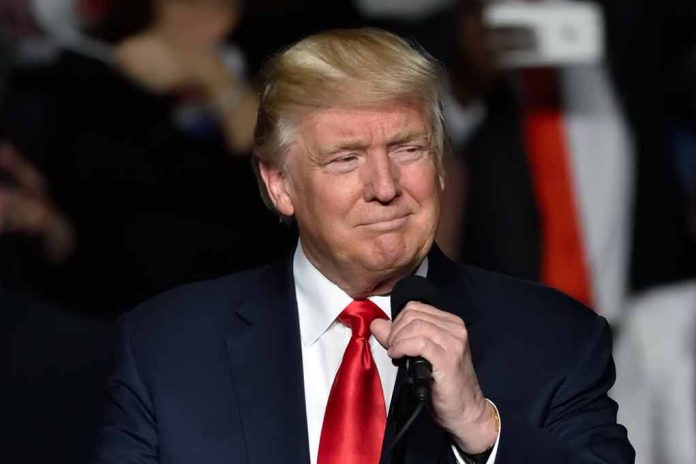🔴 Website 👉 https://u-s-news.com/
Telegram 👉 https://t.me/usnewscom_channel
The Trump administration plans to pay Americans $5,000 for having babies, prioritize married couples for prestigious scholarships, and teach women about their fertility cycles — all part of a bold strategy to reverse plummeting U.S. birth rates.
Key Takeaways
- The White House is considering a $5,000 “baby bonus” to help offset the initial costs of raising children
- Administration proposes reserving 30% of prestigious Fulbright scholarships for married students and parents
- Government-funded fertility education programs would teach women about menstrual cycles and optimal family planning
- The initiative has strong backing from Vice President JD Vance and influential figures like Elon Musk
- President Trump has expressed his desire for a national “baby boom” to counter falling birth rates
America’s Birth Rate Crisis and the Administration’s Response
President Trump’s administration is taking decisive action on a demographic challenge that has troubled policymakers for years: America’s declining birth rate. The White House is now exploring a comprehensive package of initiatives aimed at encouraging family formation and increasing the nation’s birth rate. These proposals reflect traditional values and practical solutions to address what many conservatives view as a critical threat to America’s future prosperity and cultural identity. The administration’s pronatalist agenda focuses on financial incentives, educational priorities, and fertility awareness.
The White House has been consulting with policy experts and advocates who have presented detailed proposals for addressing the birth rate decline. Central to these discussions is the recognition that financial considerations often discourage young Americans from starting families. The administration is reportedly considering a $5,000 “baby bonus” for new parents to help offset the significant costs associated with welcoming a child. This direct financial support would provide immediate relief to families facing the expenses of diapers, formula, childcare, and other necessities that make the early years of parenthood financially challenging.
JUST IN: President Trump is considering issuing a $5000 baby bonus for mothers to increase birth rates, according to the New York Times.
The White House is reportedly coming up with strategies to tackle declining birth and marriage rates.
In addition to the $5000 baby bonus,… pic.twitter.com/V6ZaVtD3d9
— Collin Rugg (@CollinRugg) April 22, 2025
Integrating Family Values into Education and Opportunity
Another innovative proposal under consideration involves reallocating 30 percent of coveted Fulbright scholarships to married applicants or those with children. This approach would represent a significant shift in how prestigious educational opportunities are distributed, prioritizing candidates who have committed to building families. The policy would send a powerful signal that family formation and educational advancement can and should go hand-in-hand, rather than forcing young people to choose between academic opportunities and starting families. By formally recognizing the value of marriage and parenthood, the administration hopes to counter cultural messages that often prioritize career advancement over family life.
“I just think this administration is inherently pronatalist,” said Simone Collins, fertility advocate.
The initiatives have gained strong support from prominent administration figures, including Vice President JD Vance, who has long advocated for policies that strengthen traditional families. Vance, whose bestselling memoir “Hillbilly Elegy” explored the breakdown of family structures in working-class communities, brings personal conviction to these policy discussions. Similarly, Elon Musk, who maintains close ties to the administration, has frequently warned about population collapse and encouraged policies that support higher birth rates. These influential voices have helped elevate fertility and family formation from niche concerns to central policy considerations.
Fertility Education and Women’s Health Awareness
Perhaps the most innovative aspect of the administration’s approach involves fertility education programs designed to provide women with better understanding of their reproductive health. The government-funded initiatives would teach women about menstrual cycles, fertility windows, and family planning techniques to help them make informed decisions about childbearing. This educational component addresses a knowledge gap that many conservatives believe has been exacerbated by a cultural reluctance to discuss fertility in practical terms. By providing women with accurate information about their bodies, the administration hopes to empower them to achieve their family goals.
“We need to channel the MAHA spirit and really dive deep into infertility,” stated Emma Waters of the Heritage Foundation.
While specific implementation details remain under discussion, the administration appears committed to addressing America’s birth rate decline through this multifaceted approach. President Trump has expressed his desire for a “baby boom” that would strengthen America’s demographic future and ensure continued growth and prosperity. The White House has not yet announced which specific proposals will be formally adopted, but there is growing confidence among advocates that fertility issues will become a significant part of the administration’s policy agenda. These measures represent a distinctly conservative approach to a challenge that affects the nation’s long-term economic and social well-being.
